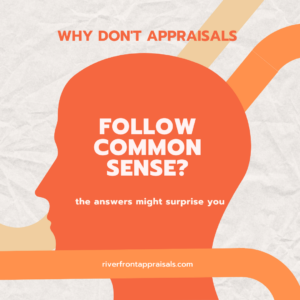
Property Taxes Just Went Up? We’ve Got You Covered!
It’s reassessment season for most folks in our area. Homeowners

If you’re like most homeowners, you’ve probably wondered about your home’s tax assessment. Is that my market value? Is that number accurate? How did they come up with their numbers? Is that the same as an appraisal? All of these questions are commonly asked, and we’ll look at them in some detail in this blog post.
Before we get started, though, keep one thing in mind: property assessment protocol differs from region to region, so if you have a specific question about your local taxing authority, give them a call. We’ll go over a couple of the most often used methods, and keep things general for the most part.
How your property is assessed
Most assessors make a site visit to your home and take exterior-only measurements. If there is a basement or upper level, they will estimate the size and degree of finish, unless they have information that states otherwise (building plans, an old MLS, other online data). They also rely on other public data / governmental databases for information about your home. This information could be accurate or inaccurate. In our experience, the majority of information found online is less than reliable.
After gathering information from a site visit and possibly other online sources, then the valuation process begins. In most areas, software using formulas and algorithms are used to assess value, and some degree of human manipulation is available. These formulas used are taken from various sources, not the least of which are recent sales in your neighborhood. Some assessors will claim that they use a variety of methods, similar to an appraiser (i.e. sales comparison approach or cost approach). However, without seeing inside the home or measuring the entire home, it is extremely difficult to value a property well, using these approaches.
So it is limited. Limited by available information, limited by the reliability of that information, and limited by the application of formulas and algorithms.
How your property is appraised
Conversely, an appraiser will usually complete a full on-site inspection (unless completing a drive-by appraisal) of your home and will go through the entire home, room-by-room, gathering detailed information about your home (size, condition, quality, materials, workmanship, amenities, etc). The appraiser will then use one approach or a combination of approaches (comparable sales, cost to rebuild, or income) to arrive at an opinion of value. The most common approach in residential real estate is to compare the subject property with other homes like it and adjust for differences (sales comparison approach).
Which method is more accurate?
The appraisal, hands down, is a more accurate opinion of your home’s value. As the assessor most of the time begins with either limited or incorrect information, how can they be expected to arrive at an accurate estimate of value? We have to be careful here, though, about using the term ‘accurate’. Although the question is often posed this way, most appraisers know that calling an appraisal ‘accurate’ can be misleading. Why? We don’t deal in terms of accuracy. Instead, we use terms like “supported” and “credible”. But at the end of the day, the better the information I have about the subject property, the ‘better’ report I can complete. The better supported, and more credible report. And if you must, the more ‘accurate’ report.
FAQ: Will my appraisal affect my taxes?
It’s becoming almost a weekly question for us. During the on-site portion of the appraisal, we get the question, “Will this affect my taxes?” I’ve come to almost expect it. I love it because in one sense it’s just comical. We all want the highest possible appraisal, but when it comes to our tax assessment, all of a sudden we’re living in a run-down shack! I’m not throwing anyone under the bus here. I’d love to pay fewer taxes myself. It’s still amusing! Anyway, back on track here. The answer I always give is, “not unless you show the assessor” to which I usually get a “heck no” response or something similar. Unless the appraiser is hired by the PVA or assessor to appraise your home, the appraiser cannot give a copy to them. The appraisal report gets sent to the client, and only the client, and from there it doesn’t get sent to the tax assessor. So rest easy. Unless your appraisal comes back lower than the assessment. We’ll talk about that next.
FAQ: How can I appeal my assessment?
Sometimes, you’ll run into the situation where your home is assessed higher than its true market value. In this situation, it might be helpful to appeal your assessment. As every taxing authority will be different, it’s always best to check with your local assessor and get their guidelines for appeal. But generally speaking, an appraisal is your best defense. It’s usually ok to use a recent appraisal from your refinance or purchase (the more recent the better), or one that was completed for you, privately. Alternatively, you can bring in recent sales in your neighborhood that may help your case, or if you are seeking a reassessment based on the condition of your home, make sure you document the reasons well (maybe your home had fire damage or water damage, or you had to remove a part of the home due to termite damage and now your square footage is smaller).
[bctt tweet=”If you’re like most homeowners, you’ve probably wondered about your home’s tax assessment. Is that my market value? Is that number accurate? How did they come up with their numbers? Is that the same as an appraisal? All of these questions are commonly asked, and we’ll look at them in some detail in this blog post.” username=”RiverfrontApp”]
Assessments are useful to the community as they are the tool used to determine how much we pay in property taxes. Our communities benefit from our taxes, so none of this is a bad thing! PVA / assessment offices are vital and they do good work! However, if you’re wondering where to get the best information about the value of your home, choose a local appraiser who knows your market, who will come in your home and complete a detailed appraisal. Whether your goal is to sell your home, give it to your kids, or simply reduce your property taxes, an appraisal is the best tool you could ask for!
Helping homeowners navigate the appraisal process,
Ryan Bays, SRA, AI-RRS

It’s reassessment season for most folks in our area. Homeowners

I feel like we all need a laugh. How about

So this may be a slight break from the norm,
Riverfront Appraisals has been providing comprehensive valuations of residential properties to Western Kentucky and Southwestern Indiana since 2008.